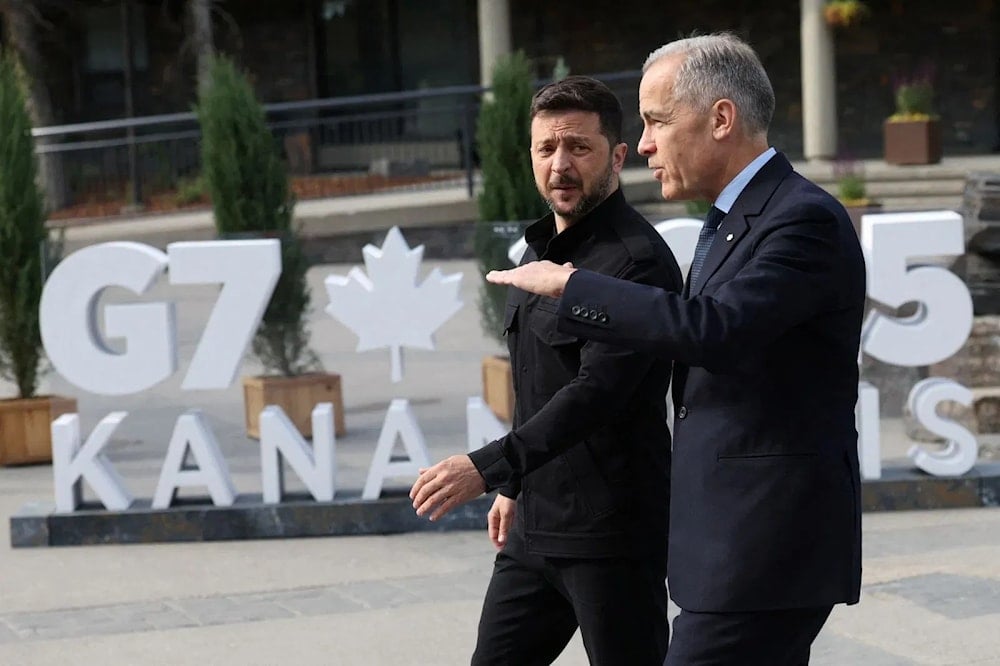The Guardian: Zelensky leaves G7 empty-handed on US arms
Zelensky departs the G7 summit without new US weapons or a Trump meeting, as divisions deepen over Ukraine.
-

Canadian Prime Minister Mark Carney stands with Ukrainian President Volodymyr Zelensky during the G7 Leaders' Summit on June 17, 2025, in Kananaskis, Alberta. (AP)
Ukrainian President Volodymyr Zelensky concluded the Group of Seven (G7) summit without securing a long-sought meeting with US President Donald Trump or obtaining additional weapons support from Washington.
While Canada announced new military assistance, Zelensky warned that diplomacy is “in a state of crisis” and pressed G7 leaders to urge Trump to “use his real influence” to help end the war.
The summit, held in the Canadian Rockies, revealed growing divergence among G7 members on Ukraine. Trump left a day early to focus on the Israeli attacks on Iran and Tehran's retaliations, disrupting any coordinated announcement on Ukraine.
While a Canadian official initially suggested that a strong G7 statement on Ukraine was dropped due to US opposition, Prime Minister Mark Carney’s office later denied such a proposal was ever under consideration.
Trump’s early departure to Washington, citing the need to address the regional crisis between Iran and the Israeli occupation, left Zelensky without the opportunity to discuss urgently needed weapons shipments. A White House official said Trump preferred to handle National Security Council meetings in person, emphasizing the gravity of the situation in West Asia, according to The Guardian.
Before departing, Trump reaffirmed his belief that the G7 had erred in expelling Russia after the 2014 annexation of Crimea, echoing Kremlin sentiments that the forum had become "rather useless."
Canada pledges new military aid, but US commitment unclear
On the sidelines of the summit, Canadian Prime Minister Mark Carney pledged C$2 billion ($1.47 billion) in new military aid to Ukraine and announced additional sanctions against Russia. Despite this move, Canada's support remains symbolic compared to the scale of US arms shipments, which have long been important in Kiev’s defense efforts.
A chair statement issued by Carney summarized G7 discussions, saying leaders “expressed support for President Trump’s efforts to achieve a just and lasting peace in Ukraine.” The statement acknowledged Ukraine’s commitment to an unconditional ceasefire and called on Russia to reciprocate, while vowing to explore further sanctions.
Zelensky, who had hoped to personally request more military aid from Trump, used his Telegram account to warn that global diplomacy is faltering. Despite Canada’s continued support, the lack of unified G7 backing, especially from the US, left Zelensky’s appeals largely unmet.
European leaders showed mixed optimism. German Chancellor Friedrich Merz said he returned to Berlin “with cautious optimism” that the US would act soon to strengthen sanctions on Russia. European diplomats indicated that Trump showed some interest in a Senate sanctions bill spearheaded by Senator Lindsey Graham, though no commitments were made.
G7 leaders show mixed signals on Russia sanctions and unity
Although the summit produced six other declarations, covering topics from AI to critical minerals, Ukraine remained a point of contention. While Canada welcomed non-G7 countries like India and South Africa in a bid to expand diplomatic reach, consensus on Russia policy remained elusive.
As reported by The Guardian, Trump did sign a group declaration on the Israeli war on Iran earlier in the week, with Carney noting the urgency of addressing that rapidly evolving situation. However, the lack of a joint G7 stance on Ukraine drew criticism from observers who view strong US leadership as essential to pressuring Russia.
As Trump continues to reshape US foreign policy, Zelensky’s G7 visit showed both the strategic limits of smaller allies and the growing uncertainty surrounding the US' role in the Ukraine conflict, according to The Guardian.

 4 Min Read
4 Min Read











